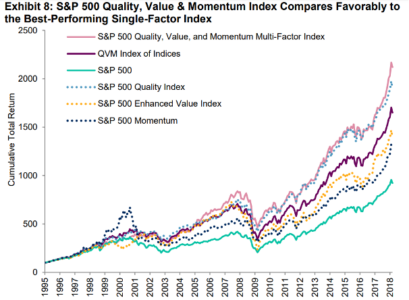Everon basically stands for the active investment approach, but we have our own definition of it. We understand “active” as a systematic, unemotional and quantitative way of analysing investment instruments. We do not try to “time” the market, as short-term market developments are usually difficult to predict and are often based on speculation. For this reason, we trade in predefined time intervals, which can be shorter or longer depending on the market phase and market fluctuations.
We evaluate a global universe of investment instruments (e.g. equities) according to specific criteria, such as the risk or quality of a security. The analysis also considers various “factors” whose existence is recognised in science. Combining these criteria and factors enables us to actively adjust our strategies to generate optimal risk-adjusted returns over the long term. This means optimising the return in relation to the risk taken. The investment style is called “multi-factor investing”.
Reading tip: AMCs – actively managed certificates
REASONS FOR THE ACTIVE EVERON APPROACH
Any customer wishes can be taken into account.
This includes both the explicit inclusion and the explicit exclusion of specific companies/titles.
With our investment approach, we pursue a so-called “multi-factor strategy”.
More than 50 years ago, scientists proved that certain factors in the market allow investors to earn an additional risk premium above the market return if they are exposed to these factors through their investment. An example is the «Size» factor, which states that small companies generate an excess return over large companies.

Other well known and academically accepted factors are «Quality», «Momentum», and «Value» (see chart above). Therefore, some providers offer a product (usually an exchange-traded fund, so-called ETF) of this factor by mapping a particular index. However, it has been found that the combination of different factors in a portfolio is much better performing than investing in single factors or investing in the whole market itself. This is the basis of Everon’s investment philosophy.
We have the opportunity to focus on different factors in different market phases.
Active investing offers individual solutions for each investor. It has been shown that certain factors are particularly suitable in certain market phases. This allows us to manage the portfolio, especially in more turbulent times actively. In this way, risk-return ratios can be created that are impossible with a passive investment (e.g. the entire Swiss market).
Through direct investment, the client is a shareholder in the company.
If one holds genuine company shares, dividends are paid out directly, and all shareholder rights and obligations are open, such as voting rights. This also makes it possible to influence the company actively. Our offer is aimed at clients who care about what is in their investment portfolio. The portfolio is fully transparent at all times. This is not the case with many passive investment instruments: By mapping an entire market, you also invest in areas or companies that may not be desirable. Due to our direct and active approach, we can consistently implement any type of investment according to your wishes. We are neither bound to certain products nor predefined compositions of indices. This enables us to incorporate the latest scientific findings into our strategies in the future as well.
The advantage over implementing an active approach ourselves: Our expertise in assessing individual investment instruments and avoiding so-called “behavioural biases”.
“Behavioural biases are features of human psychology that lead individuals to make sub-optimal investment decisions. The best example is the so-called “herding”, also comparable to the recently prominent “Fear of Missing Out (FOMO)”. It’s about the tendency of people to invest in stocks that have already performed very well. Individuals tend to do what others are doing (so-called “herding” or herd instinct) or get the feeling that they are missing out on a unique opportunity (“FOMO”).
Active investing helps to fulfil various functions of the financial markets.
Active investing contributes to the efficiency of financial markets. Market efficiency means that the market price reflects the actual value correctly or that all information available to market participants is correctly valued. Inefficient markets, capital flows to “good” companies, while “bad” companies receive no capital and thus disappear from the market sooner or later. Furthermore, fair pricing emerges as active investors with different views operate in the markets. It provides liquidity for buyers and sellers. On the other hand, passive investors allocate capital quasi “blindly”, as they only buy and sell securities in connection with the mapping of the index and thus do not carry out any quality check.
Read on in our journal:
